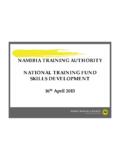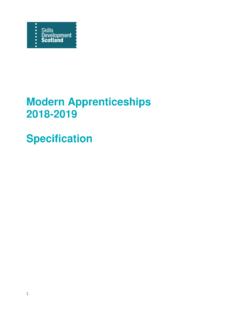Transcription of AEB funding rules and rates 2017/18 - Learning & Skills
1 AEB workshop slides 2017 . AEB funding rules and rates 2017 /18. Nick Linford Director at Lsect Agenda 10:30 AEB overview, key documents and changes 11:10 funding entitlements and streamlined' qualification eligibility or RARPA. 11:50 Break for refreshments 12:10 The Single Activity Matrix and full or co-funded funding formula 13:00 Break for lunch 13:50 Monthly funding and making sense of the different funding eligibility 14:30 The ILR and related data tools 15:00 Curriculum planning hints and tips 15:30 End For more workshops visit 1. AEB workshop slides 2017 . AEB overview, key documents and changes Nick Linford Director at Lsect The Adult Education Budget fixed at Brings together the previous Adult Skills Budget, Community Learning and Discretionary Learner Support into a new single budget line.. As at 20 February 2017 , the DfE still hasn't published an SFA grant letter for 2017 /18.
2 For more workshops visit 2. AEB workshop slides 2017 . The four AEB provision categories The DfE says the AEB provision has broadly four categories: 1. Statutory entitlements > English and maths GCSE and functional Skills up to Level 2 (including as part of a traineeship), for those aged 19 and over who have not achieved a GCSE grade 4-9. > Provision to support progression up to a first full Level 2, or a first full Level 2, for those aged 19 to 23. > First full Level 3 for those aged 19 to 23. 2. Skills provision for unemployed 3. Traineeships 4. Community Learning for learners furthest from Learning or employment Biggest initial difference from Adult Skills Budget is that it includes community Learning and excludes apprenticeships What else makes the AEB different from the ASB? This is an executive summary of the changes that we plan to make as part of the transition to full Skills devolution starting from 2018/19.
3 We have focused on the aspects that will enable the establishment of flexible commissioning before the transfer of responsibilities to local areas.. it will have much greater flexibility in how colleges and other training organisations focus on responding to local economic priorities and outcomes . Flexibility at level 2 and below: We have removed the requirement for all delivery we fund to be in the form of a qualification. We only require a qualification to be delivered where a learner is exercising their legal entitlement to a first full Level 2 or Level 3 and/or English and maths.. Devolution of funding starting from 2018/19 after area reviews: There can be no devolution of the AEB to an area before successful completion of an area review . For more workshops visit 3. AEB workshop slides 2017 . Some tendering of the AEB for 2017 /18. 110 million from 1 August 2017 to 31 July 2018.
4 Independent training providers will need to tender in order to have an AEB allocation Grant funded providers (like colleges) do not need to tender but can choose to do so if they wish to try and increase their AEB allocation One year contract because . Devolution (2018/19). > Cambridgeshire and Peterborough > Greater Manchester > Liverpool City Region > Sheffield City Region > Tees Valley > West Midlands > West of England > And Greater London (2019/20). Key current docs and sources 2017 /18 AEB funding ations-getting-approval-for- funding t/publications/adult-education- /adult-education-budget- funding -and- As at 20 Feb 2017 , not yet updated for 2017 /18. budget- funding - rates -and- performance-management- rules - 2017 -to-201 8. formula- 2017 -to-2018. As at 20 Feb 2017 , not yet updated for 2017 /18 specification-validation- rules -and-appen dices- 2017 -to-2018. For more workshops visit 4. AEB workshop slides 2017 .
5 Four key changes for 2017 /18. From 1 August 2017 , we will not fund learners to study, or continue to study, with the legacy maths and English GCSEs. After this date, all learners must undertake the reformed GCSEs graded 9-1.. Para 34 page 9 ( rates ) In 2016 to 2017 we funded any 16- to 18-year-old who turned 19 in their second or subsequent funding year of a single programme of study. We funded these learners (not in sixth-form colleges, schools or academies) at 16 to 19 rates using the Education funding Agency's (EFA's) 16 to 19 funding model. The EFA will be directly funding these learners in 2017 to 2018; there should be no impact to your funding . This does not apply where the learner is on a traineeship and you do not hold an EFA contract . The non-core' qualifications added to the entitlement will be available for the 2016 to 2017 funding year. We will not consider these for inclusion in the 2017 to 2018 funding year as we move towards a unified entitlements offer for 16- to 23-year-olds.
6 Para 80 on page 12 ( rules ): You must take your own legal advice about the impact of Public Contracts Regulations 2015 on your recruitment of delivery subcontractors and have this advice available for inspection by us on request.. funding entitlements and streamlined'. qualification eligibility or RARPA. For more workshops visit 5. AEB workshop slides 2017 . funding Learning aims With end of QCF, alignment with DfE and creating a flexible' local offer it's a big change programme > Legal entitlements fully-funded (firstness) offer English and maths and Level 2 and 3. We are working with the DfE and EFA on a single, streamlined process for qualification eligibility as part of the Technical and Professional Education reforms.. > Local flexibility (including non-qualification). Level 2 and below including non-qualification with RARPA. How qualification level maps to public funding '.
7 For more workshops visit 6. AEB workshop slides 2017 . Legal entitlement qualification approval In the 16/17 the qualifications in scope for the legal entitlements are: CORE. NON-CORE. The non-core' qualifications added to the entitlement will be available for the 2016 to 2017 funding year. We will not consider these for inclusion in the 2017 to 2018 funding year as we move towards a unified entitlements offer for 16- to 23-year-olds There are 264 non-core qualifications. Legal entitlement qualification approval The entitlements allow learners aged: > 19 to 23 to be fully funded for a first qual at Level 2 and/or Level 3. > 19+ to be fully funded for a qual in English or maths up to and including Level 2. As we move towards devolution of adult Skills and implement the recommendations arising from the Skills Plan the SFA will work with DfE to move towards greater alignment of technical qualifications for learners aged 16 to 19 and 19 to 23.
8 From 2017 to 2018 only those technical and applied qualifications appearing in the 2018 and 2019 performance tables will be in scope for the 19 to 23. entitlements and, apart from the general qualifications identified above, no other qualifications will be included. August 2016: Draft AEB funding rules : The Post 16 Skills Plan [15 routes] announced the reform of technical education and we are working through the implications of this for legal entitlements and the local Learning offer.. For more workshops visit 7. AEB workshop slides 2017 . Local flexibility qualification approval All about the move towards full devolution of the AEB.. As part of this transition we have introduced local flexibility.. To support local area needs and deliver agreed local outcomes, colleges and other training organisations will decide on the most appropriate form of training provision. This may or may not include qualifications.
9 We only require delivery of a qualification where a learner exercises their legal entitlement to a first full Level 2 or Level 3 and/or English and maths . If qualification used as part of local flexibility it must be eligible, but formal SFA approval process scrapped. However, must be on RQF, have Guided Learning (GL) recorded as a component of Total Qualification Time (TQT). and adhere to 6 SFA principles ( not be vendor qual). Existing quals must have a minimum glh applied. So not all quals on RQF automatically eligible. One of the 6 principles is: available to learners who need help to move into work, or remove a barrier to getting into work . RARPA. Where you are not delivering a regulated qualification you must ensure that you have appropriate and robust quality assurance processes in place. For instance Recognising and Recording Progress and Achievement' (RARPA). that would be acceptable to Office of Standards in Education (Ofsted).
10 This guidance may also be of interest to teachers using RARPA. While it has been developed and tested on provision for learners with Learning difficulties, the process may also be used for any Learning programmes and groups of learners, although some of the criteria may require minor modification.. a template for recording information on how to use the standards, criteria and evidence and examples derived from practice is provided in section 3.. For more workshops visit 8. AEB workshop slides 2017 . The five stages of RARPA. 1. Aims appropriate to an individual learner or groups of learners (clearly stated Learning aims). 2. Initial assessment to establish the learner's starting point 3. Identification of appropriately challenging Learning objectives: initial, renegotiated and revised 4. Recognition and recording of progress and achievement during programme (formative assessment): teacher feedback to learners, learner reflection, progress reviews 5.




![[Apprenticeship Levy-paying Employer] - ucem.ac.uk](/cache/preview/d/9/3/6/6/1/7/5/thumb-d9366175c9009a62355654870a1bf234.jpg)


